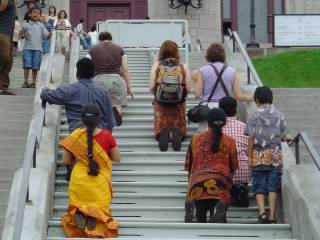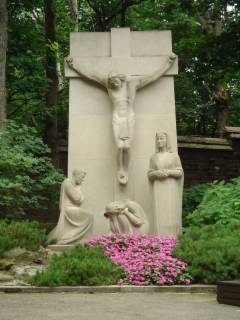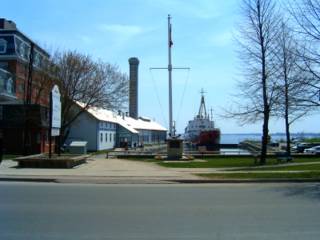Thursday, December 16, 2004
What should I do when I first arrive in McGill University?
1: You should try to meet your supervisor as soon as possible if you can. If you manage to do that, he/she would let you know most of what you should do which may be dependent on the department you are from or the program you are doing. You should also ask him/her whether he can provide you with a computer, office space and internet access. Don’t forget to consult him/her about the courses you should take. This is important since the date you arrive may be very near to the deadline for taking the courses and if you can’t meet the deadline, you have to pay an extra charge for each courses and sometimes you can’t take that course at all. This is very important particularly if you want to do Master’s.
2: At McGill website, visit http://www.mcgill.ca/gps/ . This helpful website would give you useful information regarding registration periods and other events. You may find the answer of lots of your question relating awards and scholarship, thesis and non-thesis programs, convocation and graduation, etc there. For more information, search for GRADUATE AND POSTDOCTORAL STUDIES CALENDAR which is a PDF document updated each year. Through this document, you will find a full collection of information such as registration and some other critical deadline you may need. At the moment, (for the academic year 2004-2005), the file is available at : http://upload.mcgill.ca/courses/GPS0405.pdf .
3: During registration period, first of all, you should try to attend James Administration Building which is near the Milton gate of McGill (the gate which opens to the University Street). You should go to the second floor to the office below:
Admissions, Recruitment and Registrar’s Office
James Administration Building
Room 205
In the website below, you can find the office hours and the emails of the persons responsible for helping you regarding different registration affairs:
http://www.mcgill.ca/student-records/contact/
You must take your CAQ, passport, study permit and your letter of admission with you there. You probably have received also a Permanent Code application form with your package from McGill. If you have not posted that form once you have been in Iran, you should fill that form out and submit that as well. In that office, your photo will be taken and your McGill ID card will be issued on the spot.
If you haven’t received your CAQ once you were in Iran, before doing the above step, you should go to the address below:
383, rue Saint-Jacques, 4th Floor
Montreal (Quebec) H2Y 1N9Phone: (514) 873-2528
with your passport and study permit and the CAQ number you probably have. They will issue your CAQ and then you can attend the office mentioned above in McGill University with other documents mentioned.
4: After you finish your primary registration in James Administration Building, you have to register for the courses you want to take each semester. Generally, when you arrive in McGill, you already have an account in Minerva website which is created for you once your file in the admission committee has been processed. At the moment, the website address is:
http://www.mcgill.ca/minerva-students/
where you can login, then go to Students Menu and then click on Registration Menu and there you can start registering for the courses. For any question regarding Minerva, you can use the Minerva student help service available at:
http://www.mcgill.ca/minerva-students/help/
One of the important things is that you should try to contact your department graduate secretary who is responsible for helping you registering for the courses. The most tricky thing is that, in some departments, even if you don’t need to take any courses (which is usually the case for PhD programs), you have to register for a code usually named as Confirm Grad Reg. which is to confirm that you have registered as a full-time student. Sometimes the secretary forgets to remind you about that. You should ask him/her if such thing exists in your department and in case it does, ask him/her to give you the code you should enter in Minerva to register for that.
5: If you are supposed to work as a research assistant, you can defer the deadline to pay your tuition fee. To do so, you should attend
Student Accounts OfficeJames Administration Building, Room 301Tel.: 514-398-3900
http://www.mcgill.ca/student-accounts/hours/
(for office hours)
You should take your research assistantship letter (which usually your supervisor is supposed to provide you with that) to that office and ask for deferral of your payment.
6: If you arrive in Fall semester, you will be charged for health insurance service fee which composes the regular fee and the dental plan fee automatically (both are obligatory in Quebec). All you should do is that a week after registration, having your McGill ID card, attend the address below :
International Student Services
William & Mary Brown Student Services Building (known as Brown Building)3600 McTavish Street, Room 3215Tel : 514-398-6012
And pick up your Health Insurance card. Try to do it as soon as possible since after a while, not picking up your card may bring a HOLD to your Minerva file which would not let you register for the courses you want.
However, if you arrive in winter semester, you will only be charged for your regular health insurance and as above, you should go and pick up your card in the mentioned address. But regarding the Dental plan (which is optional), you should go to :
Thomson House
3650 McTavish St.
Montreal Qc H3A 1Y2
Tel.: (514) 398-3756
www.pgss.mcgill.ca
And on the Third floor, you should pay about 300 $ and will have the dental plan insurance. (Don’t forget to have enough cash with you because they don’t accept debit card or credit card).
7: A helpful document for international students is available at:
http://upload.mcgill.ca/internationalstudents/ISSHandbook2004.pdf
which is updated each and every academic year.
Finally, don’t forget to visit McGill Persians ,where you can find lots of who would welcome you to join and are ready to help.
2: At McGill website, visit http://www.mcgill.ca/gps/ . This helpful website would give you useful information regarding registration periods and other events. You may find the answer of lots of your question relating awards and scholarship, thesis and non-thesis programs, convocation and graduation, etc there. For more information, search for GRADUATE AND POSTDOCTORAL STUDIES CALENDAR which is a PDF document updated each year. Through this document, you will find a full collection of information such as registration and some other critical deadline you may need. At the moment, (for the academic year 2004-2005), the file is available at : http://upload.mcgill.ca/courses/GPS0405.pdf .
3: During registration period, first of all, you should try to attend James Administration Building which is near the Milton gate of McGill (the gate which opens to the University Street). You should go to the second floor to the office below:
Admissions, Recruitment and Registrar’s Office
James Administration Building
Room 205
In the website below, you can find the office hours and the emails of the persons responsible for helping you regarding different registration affairs:
http://www.mcgill.ca/student-records/contact/
You must take your CAQ, passport, study permit and your letter of admission with you there. You probably have received also a Permanent Code application form with your package from McGill. If you have not posted that form once you have been in Iran, you should fill that form out and submit that as well. In that office, your photo will be taken and your McGill ID card will be issued on the spot.
If you haven’t received your CAQ once you were in Iran, before doing the above step, you should go to the address below:
383, rue Saint-Jacques, 4th Floor
Montreal (Quebec) H2Y 1N9Phone: (514) 873-2528
with your passport and study permit and the CAQ number you probably have. They will issue your CAQ and then you can attend the office mentioned above in McGill University with other documents mentioned.
4: After you finish your primary registration in James Administration Building, you have to register for the courses you want to take each semester. Generally, when you arrive in McGill, you already have an account in Minerva website which is created for you once your file in the admission committee has been processed. At the moment, the website address is:
http://www.mcgill.ca/minerva-students/
where you can login, then go to Students Menu and then click on Registration Menu and there you can start registering for the courses. For any question regarding Minerva, you can use the Minerva student help service available at:
http://www.mcgill.ca/minerva-students/help/
One of the important things is that you should try to contact your department graduate secretary who is responsible for helping you registering for the courses. The most tricky thing is that, in some departments, even if you don’t need to take any courses (which is usually the case for PhD programs), you have to register for a code usually named as Confirm Grad Reg. which is to confirm that you have registered as a full-time student. Sometimes the secretary forgets to remind you about that. You should ask him/her if such thing exists in your department and in case it does, ask him/her to give you the code you should enter in Minerva to register for that.
5: If you are supposed to work as a research assistant, you can defer the deadline to pay your tuition fee. To do so, you should attend
Student Accounts OfficeJames Administration Building, Room 301Tel.: 514-398-3900
http://www.mcgill.ca/student-accounts/hours/
(for office hours)
You should take your research assistantship letter (which usually your supervisor is supposed to provide you with that) to that office and ask for deferral of your payment.
6: If you arrive in Fall semester, you will be charged for health insurance service fee which composes the regular fee and the dental plan fee automatically (both are obligatory in Quebec). All you should do is that a week after registration, having your McGill ID card, attend the address below :
International Student Services
William & Mary Brown Student Services Building (known as Brown Building)3600 McTavish Street, Room 3215Tel : 514-398-6012
And pick up your Health Insurance card. Try to do it as soon as possible since after a while, not picking up your card may bring a HOLD to your Minerva file which would not let you register for the courses you want.
However, if you arrive in winter semester, you will only be charged for your regular health insurance and as above, you should go and pick up your card in the mentioned address. But regarding the Dental plan (which is optional), you should go to :
Thomson House
3650 McTavish St.
Montreal Qc H3A 1Y2
Tel.: (514) 398-3756
www.pgss.mcgill.ca
And on the Third floor, you should pay about 300 $ and will have the dental plan insurance. (Don’t forget to have enough cash with you because they don’t accept debit card or credit card).
7: A helpful document for international students is available at:
http://upload.mcgill.ca/internationalstudents/ISSHandbook2004.pdf
which is updated each and every academic year.
Finally, don’t forget to visit McGill Persians ,where you can find lots of who would welcome you to join and are ready to help.
Sunday, December 12, 2004
What are Administrative Fee Bursary and Capital Campaign Fee exemption programs?
You can save almost $250 per year by applying for these two awards. They are quite easy to get and almost everybody who applies will get it! Here, you can find more information about Administrative Fee Bursary program and Capital Campaign Fee exemption program. Application forms for these awards are available from the Financial Aid and Awards Office located on the SGW Campus, McConnell Library Building, LB-085, and from the Forms section of the Financial Aid and Awards website. Applications are also available at the Dean of Students Information Centre located on the Loyola campus, AD-121.
Thursday, December 02, 2004
What should I do when I just arrive in Montreal?
- Consult your friends to find out if you should buy a monthly pass, a weekly pass or bus tickets. For more information on public transportation in Montreal please see this post.
- Contact your supervisor and sign the contract as soon as possible (if you get any financial aid).
- Apply to get your permanent code.
- Register and get your student ID card at LB 185 (Have your passport available for identification).
- Give a copy of your CAQ, study permit or passport to the ISO (For students who begin their program in FALL 2004, the deadline is – September 21, 2004 and for those who begin their program in WINTER 2005, the deadline is – January 17, 2005).
- Get your health care card from ISO.
- Search for an apartment.
- Open a bank account and let Payroll Office (ER building, 5th floor) know your acount info.
- Get your Social Insurance Number card at the office related to your address.
- Get your International Student Identification Card (ISIC).
Friday, September 10, 2004
Thursday, August 12, 2004
How is the public transportation in Montreal?
Société de transport de Montréal (STM), the 15th largest corporation in Québec, is the public transportation company of Montreal. Montreal has an excellent public transportation system based on a network of bus and subway (or Metro, as it is known in Montreal) routes which quickly carry commuters to their destinations.
For any information you want to know about bus and Metro routes and its schedule, you can use STM website. Since its inception in 1997, the number of visitors to this Website has been steadily increasing, reaching 4.3 million in 2002! It's a respectable number, I think.
Entre deux arrêts (the Between Stops) service is available to women travelling alone on bus routes in the evening, including on nighttime routes. The Between Stops service allows a woman to get off the bus between regular bus stops.
Just one more point about the buses in Montreal. When you want to get off from the rear door, you should open it by yourself! When the bus stops, a green light above the rear door turns on and then depending on the type of the bus, you should either push a touch-sensitive bar or step down on the lower stair to open the rear door. Don't blame the driver for not openning the door for you :)
For any information you want to know about bus and Metro routes and its schedule, you can use STM website. Since its inception in 1997, the number of visitors to this Website has been steadily increasing, reaching 4.3 million in 2002! It's a respectable number, I think.
Entre deux arrêts (the Between Stops) service is available to women travelling alone on bus routes in the evening, including on nighttime routes. The Between Stops service allows a woman to get off the bus between regular bus stops.
Just one more point about the buses in Montreal. When you want to get off from the rear door, you should open it by yourself! When the bus stops, a green light above the rear door turns on and then depending on the type of the bus, you should either push a touch-sensitive bar or step down on the lower stair to open the rear door. Don't blame the driver for not openning the door for you :)
Saturday, July 31, 2004
How can I find temporary residences in Montreal?
These are a few temporary residences in Montreal recommended by Concordia University. I haven't been in any one of them but they should be good.
1. Auberge Alternative du Viex-Montreal, Tel: 282-8069
2. Auberge de Jeunesse Internationale, Tel: 1-800-663-3317843-3317
3. Auberge de la Fontaine, Tel: 597-0166, Address: 1301 Rachel E.
4. Auberge de Paris, Tel: 1-800-567-7217/522-6861, another website
5. A Montreal Oasis, Tel: 935-2313
6. Welcome Bed and Breakfast, Tel: 1-800-227-5897/844-5897
7. YWCA (women only), Tel: 866-9941, Address: 1355 Rene Levesque
Number 2 and 7 are located in very good places for SGW campus of Concordia University. You can find more in this website. Make sure to reserve a temporary residence before your arrival in Montreal.
1. Auberge Alternative du Viex-Montreal, Tel: 282-8069
2. Auberge de Jeunesse Internationale, Tel: 1-800-663-3317843-3317
3. Auberge de la Fontaine, Tel: 597-0166, Address: 1301 Rachel E.
4. Auberge de Paris, Tel: 1-800-567-7217/522-6861, another website
5. A Montreal Oasis, Tel: 935-2313
6. Welcome Bed and Breakfast, Tel: 1-800-227-5897/844-5897
7. YWCA (women only), Tel: 866-9941, Address: 1355 Rene Levesque
Number 2 and 7 are located in very good places for SGW campus of Concordia University. You can find more in this website. Make sure to reserve a temporary residence before your arrival in Montreal.
Does Concordia University have an on-campus residence?
Yes, it does. Concordia’s Residence, Hingston Hall, is located at the Loyola Campus. This type of accommodation is ideal for those with the bulk of their courses at Loyola, or who prefer sharing living quarters with other relatively new students in a friendly but enclosed environment. Space is limited, however, so see the details and fill out an application form by visiting the Residence’s web site.
(From Concordia University website).
(From Concordia University website).
Tuesday, July 27, 2004
How to wear in the day of visa interview?
It might seem an inportant issue to the visa applicants that how it's better to wear in the day of their interview. I'm not gonna say that it's not important at all, but you don't need to be worried about that so much. The thing I'm going to mention is based on my own experience for the US visa.
Some people wear formally; let's say a suit and a tie and stuff like that while the others ( in my opinion, majority of applicants ) prefer to put on just a T-shirt and jeans.
The thing is this :
No matter what you wear; they just need to be tidy and clean.
I remember that I just had a plain shirt, and my pants were what I was regularly wearing.
Oh! something which might be important; when I was inside the US consulate in Istanbul, that was too hot there, and I had a sweater or something. I couldn't dare to put it off, and I had to tolerate the situation for nearly two hours :))
Relax, whenever you think it's necessary to do somthing, do it!
The funny thing was that I saw some turkish people who had some clothes which seemed to be nightdress!
NOTE : The thing I told was just about what I experienced at the US consulates in Dubai and Istanbul; any comment about any other US consulate or Canadian Embassy is very welcome!
Some people wear formally; let's say a suit and a tie and stuff like that while the others ( in my opinion, majority of applicants ) prefer to put on just a T-shirt and jeans.
The thing is this :
No matter what you wear; they just need to be tidy and clean.
I remember that I just had a plain shirt, and my pants were what I was regularly wearing.
Oh! something which might be important; when I was inside the US consulate in Istanbul, that was too hot there, and I had a sweater or something. I couldn't dare to put it off, and I had to tolerate the situation for nearly two hours :))
Relax, whenever you think it's necessary to do somthing, do it!
The funny thing was that I saw some turkish people who had some clothes which seemed to be nightdress!
NOTE : The thing I told was just about what I experienced at the US consulates in Dubai and Istanbul; any comment about any other US consulate or Canadian Embassy is very welcome!
Monday, July 26, 2004
How do electirc plugs in Canada look like?
There are two types of electric plugs and they look like this. Nominal voltage in Canada is 120V and the frequency is 60Hz.
Sunday, July 25, 2004
Saturday, July 24, 2004
Friday, July 23, 2004
Community Weblog of Persian Students in the UK
Community Weblog of Persian Students in the UK was born on 19th of May 2003 after four students - two of them already active bloggers at the time - discussed the idea of a group weblog in their university halls of residence. Their intention was to create an online environment where its members could:
- Share their thoughts and experiences of student life.
- Write in English, so the content of the blog would become accessible to everyone. In this way members could also have the chance to practice writing in English in areas other than their university studies.
- Learn from each other.
- Practice team work.
- Get to know about other students.
- Find new connections and links.
- Help newcomers to find useful links and information.
- Create a “virtual” identity in Britain.
- Maximise the fun of being a student in the UK.
This introducation was from the Weblog. They also have a PhotoBlog. Congratulations and Good luck!
How much financial support should I show to the embassy to get my visa?
You should have $10,000 for twelve-month period, prorated at $833 per month, plus cost of tuition. If you are married you should also have $4,000 for twelve-month period prorated at $333 per month for your spouse and $3,000 for twelve-month period per dependent child of any age, prorated at $255 per month. Please read section 7.5 of OP12 Students.
Thursday, July 22, 2004
Studying in Sweden and the rest of Scandinavia
For those who are interested to continue their educations, one of the choices is good schools in Europe. Sweden is also one of the countries in Europe that plays the leading research in the areas of Internet and Telecommunications ( Ericsson ), Environment and Mechanical Engineering ( Automative companies such as Volvo, SKF , Scania).
For more information about the top five university in the above mentioned fields in Scandinavia ( Sweden, Denmark ,Norway and Finland), you can check the web-sites, and look for International Masters Programs available for international students.
All the programs are in ENGLISH and there is NO Tuition fees for studying . Students must cover their living expenses approximately 700-1000 US$ per month. Deadlines vary between January to April.
Finland :
Helsinki University of Technology
For more information about the top five university in the above mentioned fields in Scandinavia ( Sweden, Denmark ,Norway and Finland), you can check the web-sites, and look for International Masters Programs available for international students.
All the programs are in ENGLISH and there is NO Tuition fees for studying . Students must cover their living expenses approximately 700-1000 US$ per month. Deadlines vary between January to April.
Finland :
Helsinki University of Technology
Sweden:
Chalmers University of Technology
Royal Institute of Technology
Lund University of Technology
Denmark:
Technical University of Denmark
Norway:
Norwegian University of Science and Technology
Best wishes and good luck
Kamyar Kazemi-Moud
Helpful resources for Persian students who intend to study abroad
"How to Apply to Graduate Schools" was the first resource that I used to start the procedure of applying to foreign universities. I should express my deepest gratitude to Hazhir Rahmandad and Mehdi Yahyanejad who were pioneers in helping Persian students to continue their education abroad. You can find more resources here.
Information for Persian students in the UK and Irland
If you're going to the UK, you can find very useful information here. Special thanks to Hossein Shahverdi.
FAQ for students of University of Alberta
You can find a nice FAQ file here. It is provided by Iranian Students Association of the University of Alberta.
Wednesday, July 21, 2004
Subscribe to:
Comments (Atom)

























